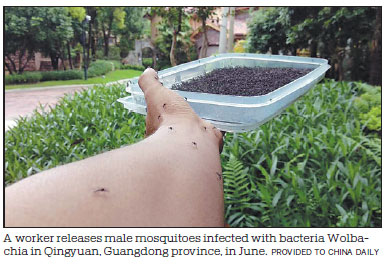'Army' wins war against mosquitoes
Residential area in Qingyuan achieves 80% success in overcoming menace
When the residents of a high-end residential community in Qingyuan, northern Guangdong province, complained about mosquito menace and rashes because of mosquito bites, the company managing the property got into action immediately. It tried every means possible, including installing mosquito killer lamps and spraying pesticides, but with little success.
Finally, an army of male mosquitoes - one million of them three times a week - were released in the 40-hectare Meilin Lake community and surrounding areas to take on the female mosquitoes head-on. The results were phenomenal.
"Since the project started in May, about 80 percent of female mosquitoes in the (experimental) area have been eliminated," said Qian Wei, deputy general manager of Guangzhou Wolbaki Biotech Co, the company that helped the community to successfully combat the menace.
"Our goal is 90 percent, which is to be achieved probably by October," said Qian.
Yao Hanfen, a manager of the company that manages the property, said she was relieved the situation in the community has greatly improved because of the mosquito army.
"This community has large green areas. Last year, you could just not stand here. You would get bites all over even in daylight," said Yao.
"I hope they can continue (the project)," said Yan Yunying, who lives in the community, while acknowledging its success.
The technology used by Guangzhou Wolbaki is based on a research led by Xi Zhiyong, the chairman of the company and director of the Laboratory of Tropical Disease Control and Prevention in Guangzhou-based Sun Yat-sen University.
The research involved infecting male mosquitoes with Wolbachia, a bacteria that exists in many insects, including mosquitoes, but does not infect mammals.
Eggs produced by female mosquitoes that mate with Wolbachia-infected male counterparts are infertile, which leads to reduced mosquito population. And only female mosquitoes bite humans.
In Xi's mosquito factory, male mosquitoes are separated from the female ones and low radiation is used to render the few female mosquitoes remaining in the male throng infertile.
The male mosquitoes die within 7 to 10 days of their release, and the Wolbachia bacteria they carry also die with them, said Xi.
An article on the study, titled Incompatible and Sterile Insect Techniques Combined Eliminate Mosquitoes, appeared in the academic journal Nature in July.
Xi's team started trials in the islands of Shazai and Dadaosha, south of Guangzhou city, in 2015.
The technology "nearly eliminated two field populations of A. albopictus over a two-year period. The few mosquitoes remaining were probably migrants from outside the study area, as indicated by population genetic analyses and their presence in areas with good transport links, whereas isolated areas were mosquito-free," reads the article in Nature.
Aedes albopictus is a mosquito native to the tropical and subtropical areas of Southeast Asia. However, in the past few decades, this species has spread to many countries.
The release of male mosquitoes has stopped on the island of Dadaosha to study the time needed for the local mosquito population to recover.
Sterile insect technology using radiation has been used worldwide to control species, including the New World screwworm, Mediterranean fruit fly and melon fly from Japan's Okinawa islands in the past few decades, Xi said. "Such technology has failed in controlling pathogen-transmitting mosquitoes."
The existing efforts fall short of being effective in disease prevention in places with repeated dengue fever cases in Guangzhou, said Zhang Zhoubin, the deputy director of Guangzhou Center for Disease Control and Prevention.
According to Zhang, a combination of the old and new technologies is desired. His center is working with Xi's team to conduct trials in some places in Guangzhou city.
The traditional method of using pesticides to kill mosquitoes leads to drug resistance in the species, said Xi, who is also a professor of the Department of Microbiology and Molecular Genetics of Michigan State University. He said there was no foreseeable threat from the new technology.
Mosquitoes pose grave threat to humans by transmitting pathogens, especially those causing dengue fever, yellow fever, malaria and Zika in some countries and regions, said Yang Dazhu, deputy director general of the International Atomic Energy Agency, at a conference on the technology developed by Xi's team in Guangzhou this month.
Mosquito-transmitted malaria virus infected 200 million people and killed more than 400,000 in 2017, he said, citing the World Health Organization. About two-fifths of the world's population faces threat of dengue fever.
Yang said the IAEA provides technological support in the research. It has also made efforts in the peaceful utilization of nuclear energy, especially in preventing, controlling and diagnosing diseases in developing countries in the past six decades.
A few months ago, Sun Yat-sen University provided training to some Asian developing countries on mosquito control technology, and the training will be extended to some Latin American countries later this year, he said.
The research should identify possible problems in the large-scale application of the technology and the ways to solve them, Yang said.
Guangzhou Wolbaki has helped establish a mosquito factory in Mexico, which is capable of breeding 250,000 mosquitoes a week. Its capacity will be expanded four times.
Smaller mosquito factories are being established in countries like Singapore, Thailand and Indonesia. An international pharmaceutical company is holding talks with Guangzhou Wolbaki in this regard.
Li Xiangmiao contributed to this story.
liwenfang@chinadaily.com.cn

(China Daily Global 08/28/2019 page3)


















